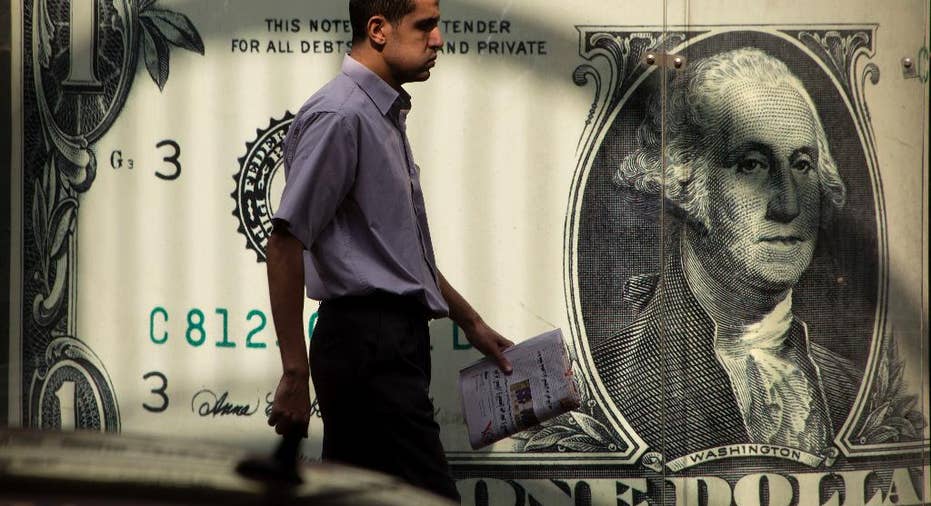Why a stronger US dollar could hinder Trump's economic plans

WASHINGTON – President-elect Donald Trump's ambitious plans to revive exports, return jobs to the United States and increase oil drilling are running up against a home-grown threat:
The surging U.S. dollar.
Since the Nov. 8 election, the dollar has shot up 5 percent. An index that tracks the dollar against other major currencies reached a 14-year high after the election before dipping a bit since then.
In part, the dollar's gain reflects the U.S. economy's strength and investor confidence that Trump will accelerate growth by slashing taxes and pumping money into roads, bridges and other infrastructure. The dollar could rise even more now that the Federal Reserve has raised interest rates and foresees three more hikes next year. With rates far lower elsewhere in the world, many investors will shift money to the United States to capitalize on higher yields — a shift that could send the dollar even higher.
Which creates a problem: An expensive dollar makes U.S. goods costlier overseas — and imports cheaper in the U.S. That's a recipe for more pain for American manufacturers. A high dollar can also lead some U.S. multinational companies to move operations to countries where their dollars go further.
And a high-priced dollar tends to shrink oil prices, thereby discouraging the increased energy production that Trump has made a centerpiece of his economic plans.
"A strong dollar will make it more challenging to boost the international competitiveness of U.S. manufacturing, bring back jobs and increase exports," says Eswar Prasad, professor of trade policy at Cornell University.
Even before the election, a comparatively strong dollar had slowed U.S. exports for much of the past two years. Exports of goods and services had peaked in October 2014 at $200 billion. The figure fell to $179 billion in March before recovering slightly as the dollar weakened. But then the dollar marched back up and accelerated after Trump's victory. It was no surprise when U.S. exports fell nearly 2 percent in October, according to the Commerce Department.
Consider what the strong dollar does to U.S. corporate earnings, too: Whatever revenue American companies earn in foreign currencies is worth less once it's exchanged into U.S. dollars and returned home. In recent weeks, American companies, from Whirlpool to Apple, have complained that the strong dollar has dented their earnings.
At Vaughn Manufacturing Co. in Nashville, Tennessee, the company president, Mark Vaughn, is fretting about the dollar's 11 percent rise against Mexico's peso since the election. Around 20 percent of Vaughn's tool-and-die business is done in Mexico. And the company competes with Chinese and Korean companies that aren't saddled with an expensive currency.
"It's a concern," he says.
A rising dollar can encourage U.S. companies to move factories and jobs overseas because it makes foreign investments cheaper. Trump, of course, has pledged to stop American companies from taking operations offshore. He's even threatened to impose a 35 percent tax on companies that leave America and then ship goods back to the United States.
The dollar's rally could also complicate the president-elect's plans to spur oil drilling by reducing environmental regulations. Oil is usually bought in dollars. So the higher the dollar's value, the fewer dollars are needed to buy a barrel of oil. The result is that the dollar-denominated price of oil drops.
When oil prices drop, energy companies tend to cut investment in drilling and production. Low oil prices are the main reason U.S. business investment plummeted late last year and in the first half of 2016, thereby slowing the economy. Oil prices have risen since Trump's victory but could retreat again if the dollar keeps rising.
The Trump transition team didn't respond to requests for comment.
William Cline, senior fellow at the Peterson Institute for International Economics, says he worries that the strong dollar could incite conflicts between the U.S. and its trading partners — something that happened during the Reagan administration in the 1980s.
Despite his reputation as a free trader, Reagan used tariffs against Japanese motorcycles and semiconductors, which had enjoyed a price edge in the U.S. market resulting from a sharp rise in the dollar. It took an extraordinary 1985 meeting at New York's Plaza Hotel to craft an arrangement with Japan, Germany and Britain to reduce the dollar's value and ease tension.
Trump, who threatened to tear up trade treaties and impose tariffs against Mexico and Japan, might be even quicker to impose sanctions against what he sees as unfair trade practices, potentially triggering a wider trade war. In an analysis it did before the election, the Peterson Institute warned that the United States could lose nearly 4.8 million jobs in a trade war that would result if Trump imposed the tariffs on Mexico and China — and they responded with equal tariffs of their own.
"The tricky thing in the case of Trump is if his administration sees trade deficits as the result of unfair trade" and not of economic forces that are pushing the dollar higher, Cline says. "You could get into a lot of trade conflicts."



















